| Revision as of 16:16, 19 April 2022 edit108.179.33.202 (talk) →SubdivisionsTags: Reverted Visual edit← Previous edit | Revision as of 16:19, 19 April 2022 edit undoLightandDark2000 (talk | contribs)Autopatrolled, Extended confirmed users, Pending changes reviewers, Rollbackers62,349 editsm Reverted edits by 108.179.33.202 (talk) to last version by Maxeto0910Tag: RollbackNext edit → | ||
| Line 62: | Line 62: | ||
| }} | }} | ||
| The '''Rhine-Main Metropolitan Region''', often simply referred to as '''Frankfurt Rhine-Main''', '''Frankfurt Rhine-Main area''' or '''Rhine-Main area''' (]: ''Rhein-Main-Gebiet'' or ''Frankfurt/Rhein-Main'', abbreviated '''FRM'''), is the second-largest ] after ], with a total population exceeding 5.8 million. The metropolitan region is located in the central-western part of Germany, and stretches over parts of three ]: ], ], and ]. The largest cities in the region are ], ], ], ], ], ], ], and ]. | |||
| The polycentric region is named after its core city, Frankfurt, and the two rivers ] and ]. The Frankfurt Rhine-Main area is officially designated as a European Metropolitan region by the German ] and covers an area of roughly {{convert|13000|km2|sqmi|sp=us}}. | The polycentric region is named after its core city, Frankfurt, and the two rivers ] and ]. The Frankfurt Rhine-Main area is officially designated as a European Metropolitan region by the German ] and covers an area of roughly {{convert|13000|km2|sqmi|sp=us}}. | ||
Revision as of 16:19, 19 April 2022
Place in Germany| Rhine-Main Metropolitan Region Rhein-Main-Gebiet | |
|---|---|
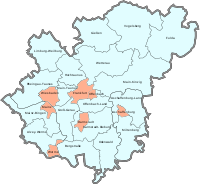 Map of the Rhine-Main metropolitan region Map of the Rhine-Main metropolitan region | |
| Country | |
| States | |
| Largest cities | Frankfurt am Main Wiesbaden Mainz Darmstadt |
| Government | |
| • Type | Frankfurt/Rhine-Main Conurbation Planning Association |
| • Verbandsdirektor | Thomas Horn (CDU) |
| Area | |
| • Metro | 14,800 km (5,700 sq mi) |
| Population | |
| • Metro | 5,808,518 |
| • Metro density | 390/km (1,000/sq mi) |
| Time zone | UTC+1 (CET) |
| GMP | 2017 |
| Nominal | €268 billion |
| Website | Planungsverband.de |
The Rhine-Main Metropolitan Region, often simply referred to as Frankfurt Rhine-Main, Frankfurt Rhine-Main area or Rhine-Main area (German: Rhein-Main-Gebiet or Frankfurt/Rhein-Main, abbreviated FRM), is the second-largest metropolitan region in Germany after Rhine-Ruhr, with a total population exceeding 5.8 million. The metropolitan region is located in the central-western part of Germany, and stretches over parts of three German states: Hesse, Rhineland-Palatinate, and Bavaria. The largest cities in the region are Frankfurt am Main, Wiesbaden, Mainz, Darmstadt, Offenbach, Worms, Hanau, and Aschaffenburg.
The polycentric region is named after its core city, Frankfurt, and the two rivers Rhine and Main. The Frankfurt Rhine-Main area is officially designated as a European Metropolitan region by the German Federal Ministry of Transport, Building and Urban Affairs and covers an area of roughly 13,000 square kilometers (5,000 sq mi).
Subdivisions
Although Rhine-Main is considered to be a polycentric metropolitan region, the economic size and political weight of the city of Frankfurt sets it into a very monocentric relation with her commuter belt. Since the early 1970s, the Frankfurt am Main metropolitan area (German: Ballungsraum Frankfurt/Rhein-Main) is defined as the area encompassing the cities of Frankfurt and Offenbach and their directly neighboring districts.
The Regierungsbezirk Darmstadt of the state of Hesse could be seen as the next administrative division, for it lies entirely within the metropolitan region and further includes the cities of Darmstadt and Wiesbaden along with a number of larger districts. Only on a level further, the metropolitan region also includes the cities and districts of Mainz and Aschaffenburg in the two adjoining federal states of Rhineland-Palatinate and Bavaria.
Metropolitan region and larger urban zones
Eurostat's 'Urban Audit' splits the Frankfurt Rhine-Main region into four Larger Urban Zones (LUZ). These zones do exclude a number of districts in the metropolitan area.
| Urban zone | Major cities | Population | Area |
|---|---|---|---|
| Frankfurt am Main urban zone | 2,729,562 | 4,305 km | |
| Frankfurt am Main | 763,380 | 280 km | |
| Offenbach am Main | 130,280 | 210 km | |
| Wiesbaden urban zone | 462,098 | 1,015 km | |
| Wiesbaden | 278,474 | 204 km | |
| Darmstadt urban zone | 439,084 | 781 km | |
| Darmstadt | 159,878 | 204 km | |
| Mainz urban zone | 403,849 | 704 km | |
| Mainz | 218,578 | 98 km | |
| Rhine-Main | 5,808,518 | 14,755 km | |
Cities and districts
| Picture | City or district | Area | Population |
|---|---|---|---|

|
Frankfurt am Main | 248 km² | 750,000 |

|
Offenbach am Main | 45 km² | 118,245 |

|
Landkreis Offenbach | 356 km² | 337,986 |

|
Main-Kinzig-Kreis | 1,397 km² | 411,956 |

|
Wetteraukreis | 122 km² | 142,191 |

|
Hochtaunuskreis | 482 km² | 233,427 |
| — | Main-Taunus-Kreis | 122 km² | 142,191 |

|
Darmstadt | 122 km² | 142,191 |

|
Landkreis Darmstadt-Dieburg | 659 km² | 289,102 |

|
Landkreis Groß-Gerau | 453 km² | 253,502 |

|
Wiesbaden | 204 km² | 275,489 |

|
Rheingau-Taunus-Kreis | 98 km² | 196,784 |
| Subtotal | Hesse | 7,445 km² | 3,778,689 |

|
Mainz | 98 km² | 196,784 |
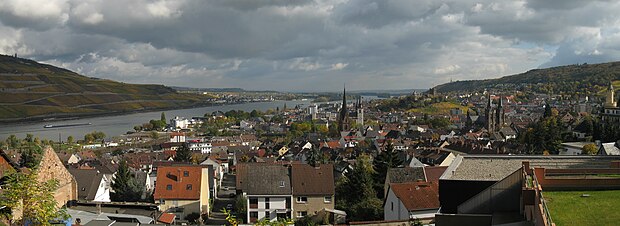
|
Mainz-Bingen | 606 km² | 201,451 |

|
Worms | 109 km² | 81,784 |
| — | Landkreis Alzey-Worms | 588 km² | 124,758 |
| Subtotal | Rhineland-Palatinate | 1405 km² | 604,777 |
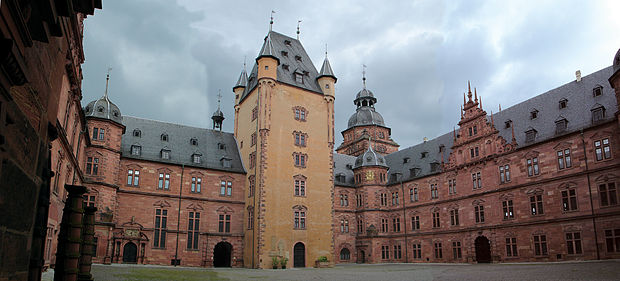
|
Aschaffenburg | 63 km² | 68,646 |
| — | Landkreis Aschaffenburg | 699 km² | 173,946 |

|
Landkreis Miltenberg | 716 km² | 130,009 |
| Subtotal | Bavaria | 1,478 km² | 372,601 |
| Total | Frankfurt Rhine-Main metropolitan region | 14,800 km² | 5,800,000 |
Economy

With its central location in southwestern Germany, the Frankfurt Rhine-Main region has been an important industrial and transport center since industrialization began in the mid-19th century. The region is a major financial center of both Germany and Europe, with the European Central Bank headquartered in Frankfurt am Main. In 2018, about 7.9% of Germany's gross domestic product (GDP) was generated in the region, as well as over three-fourths of the state of Hesse's GDP.
In addition to banking and finance, the chemical industry has had a long established presence in the metropolitan region, with the Industriepark Höchst (Höchst Industrial Park) in the southwestern outskirts of Frankfurt am Main being one of the largest industrial parks in Germany and host to over 90 chemical and pharmaceutical firms. The automobile, construction, and real estate sectors also contribute to a significant sector of the regional economy, with the latter two accounting for 18% of the GDP. Darmstadt and Wiesbaden are the site of headquarters and major offices for insurance firms.
Geographically situated in the middle of the European continent, Frankfurt Rhine-Main is one of the largest logistics hubs in the world, with major connections provided by Frankfurt Airport, Germany's and one of the world's busiest air hubs, and an extensive road and rail system. The Frankfurter Kreuz and Frankfurt am Main Hauptbahnhof are among the busiest road and rail interchanges in Europe respectively. Other major rail stations include Mainz, Frankfurt Süd, and Frankfurt Airport.
Transport
The growth of the area is chiefly to be traced to the favorable communications that promoted an early industrialization. Today, however, the importance of industrial concerns has to a great extent been replaced by banking, trade and logistics. Frankfurt lies within the populous Blue Banana region of Europe, which here runs along the Rhine valley, and the city is also a stepping stone from and to various parts of Switzerland and Southern Germany. The Rhine-Ruhr is accessible via a one-hour trip on the Cologne–Frankfurt high-speed rail line, and the air route Frankfurt–Berlin is the busiest in German domestic air travel.
Frankfurt Airport is the busiest airport by passenger traffic in Germany and one of the three busiest airports in Europe. Thereby, along with a strong railway connection, the area also serves as a major transportation hub.
Education
The Frankfurt/Rhine-Main metropolitan region is home to five universities and over 20 partly postgraduate colleges, with a total of over 200,000 students. The region's three public research universities, the
make up the Rhine Main Universities alliance. Private universities in the Frankfurt/Rhine-Main metropolitan region are
Notable colleges and universities of applied sciences (Fachhochschulen) include:
- Darmstadt University of Applied Sciences
- Frankfurt University of Applied Sciences
- RheinMain University of Applied Sciences
- Frankfurt University of Music and Performing Arts
- Städelschule
- University of Applied Sciences, Mainz
- Catholic University of Applied Sciences, Mainz
See also
Gallery
-
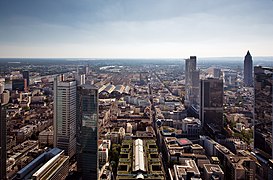 Frankfurt is the most important city of the Rhein-Main area
Frankfurt is the most important city of the Rhein-Main area
-
 Rheingau
Rheingau
-
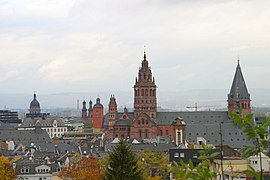 Old town of Mainz
Old town of Mainz
-
 Castle of Johannisburg in Aschaffenburg
Castle of Johannisburg in Aschaffenburg
-
 German House of Goldsmiths in Hanau
German House of Goldsmiths in Hanau
-
 Rhenish Hesse
Rhenish Hesse
-
 Darmstadt Artists' Colony
Darmstadt Artists' Colony
-
 Town Hall of Michelstadt
Town Hall of Michelstadt
References
- Regionalverband FrankfurtRheinMain. "Regionalverband FrankfurtRheinMain /". planungsverband.de.
- "Statistik-Viewer Metropolregion". 2019-12-31. Retrieved 2020-12-31.
- https://www.statistik-bw.de/VGRdL/tbls/RV2014/R2B1.zip
- Die Region Frankfurt Rhein-Main in Zahlen und Fakten (in German)
- "Frankfurt Rhein-Main in Zahlen (Frankfurt Rhein-Main in Figures". IHK Frankfurt am Main. (in German)
- Bau- und Immobilienstudie (Construction and Real Estate Study), IHK-Forum Rhein-Main. (in German)
External links
- Planungsverband Ballungsraum Frankfurt/Rhein-Main Frankfurt/Rhine-Main Conurbation Planning Association
- Region Frankfurt RheinMain online - Gateway to Europe
- Frankfurt International Airport
- Rhein-Main Metropolitan Transit
- Frankfurt Economic Support
- Frankfurt/Rhein-Main 2020 – the European metropolitan region
- One region - Boundless possibilities
| Metropolitan regions in Germany | ||
|---|---|---|
| Cities in Germany by population | |
|---|---|
| 1,000,000+ | |
| 500,000–999,999 | |
| 200,000–499,999 | |
| 100,000–199,999 |
|
50°06′N 8°42′E / 50.1°N 8.7°E / 50.1; 8.7
Categories: